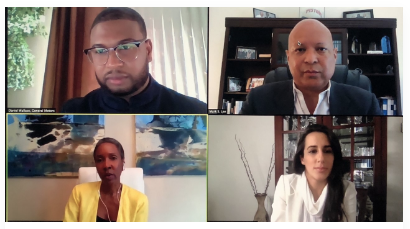Organizations and their communicators face the need to foster genuine conversations about today’s societal challenges, spanning from work environment displacement and protests to an election year that is anything but “normal.” Opting out of these discussions can impact a company’s ability to grow and thrive.
The Detroit chapters of International Association of Business Communicators and Public Relations Society of America cosponsored the online panel discussion “Diversity, Equity, Inclusion and Communication.” The first session was relevant to what’s happening today, and another is planned for Sept. 23.
Moderator Mark Lee, president and CEO of The Lee Group, said the first webinar was anything but superficial. “We didn’t just scratch the surface and say, ‘What is diversity?’ We unpacked diversity and took a deep dive into it. We wanted to get down to the deep issues and understand it.”
Too Narrowly Focused?
Panelists argued that diversity is far broader than society’s current discussion of diversity as pertaining to only gender or race.
“Diversity is recognizing the humanity and understanding the person in front of you,” said Bridget Hurd, chief diversity officer and vice president, Diversity and Inclusion, Blue Cross Blue Shield of Michigan.
Creating a culture of diversity and inclusion, she said, has four components:
- Fairness and respect
- Value and belonging
- Promoting a safe and open workplace
- Empowerment and growth
Adding ‘Belonging’ to Diversity, Equity and Inclusion
There’s a relationship between diversity and inclusion.
“Diversity, said Lydia Michael, president and owner, Blended Collective, “is inviting somebody to the dance, but then asking them to dance is part of inclusion.”
Daniel Wallace, manager, Global Diversity Initiatives, General Motors, added a third tier to diversity and inclusion: belonging – or, “dancing like no one is watching.” Communicators, he explained,
must ensure messaging is relevant to audiences in tone, feel, language – and telling more culturally rich stories that foster better connections between different groups within the workforce.
The Challenge for Communicators
Many companies issued diversity statements after the death of George Floyd. The panelists said companies should follow up these commitment statements with actionable plans. From a brand perspective, action plans should reinforce core values when communicating with internal and external audiences.
Before writing statements and helping to craft actionable plans that build trust, communicators must understand the historical context of the affected community:
- Be aware of the sensitivities; it could be as simple as adjusting terminology we use.
- Don’t be reactive by rushing out a statement; make sure it aligns with the brand.
Engaging Company Culture to Embrace Diversity, Equity and Inclusion
Being at the table is one thing, but everyone at the table must have equal opportunity to speak. Diversity, equity and inclusion can be grasped only after discussions with those who bring different perspectives.
This isn’t a new topic, but it can be difficult for everyone across an organization to embrace. Communicators have important roles in closing that gap of understanding and helping to bridge gaps among audiences to help promote an overall feeling of belonging.
Should Communicators Use More Active Language than the Catch-all Phrase of Diversity, Equity and Inclusion?
The panelists had three observations:
- Words are less weighty than the need to build a strong culture within a workforce.
- Be mindful of what the three words mean in context rather than their individual meaning.
- Communicators are talking with human beings, so let’s bring the conversation to a human level and avoid tuning things out.
Finally, panelists recommended that communicators be change agents in developing their company’s cultural competency and really thinking about its multicultural output. Simply put, we need to connect people as human beings and show one another respect.
Register here for the next session of “Diversity, Equity, Inclusion and Communication” on Sept. 23.
Gary Spondike
IABC Detroit Board Member

